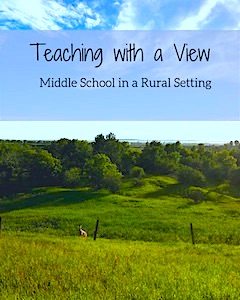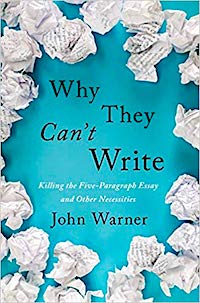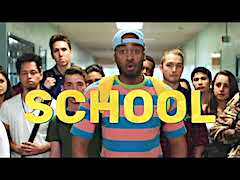Writing Should Help Kids “Find Their Truth”

When I first started the blog, it was more of a “look at what my kids do” kind of site. I shared our Notice and Note work, the different ways we try to showcase our learning – those types of things. The “how we did it” posts happen less and less as I find my voice. It isn’t because I am not proud of the work my kids do (and I will still be posting their work as we go). It’s more because the blog just keeps evolving.
My writing gives me an opportunity to speak up and call out the things I disagree with, to draw attention to areas in education I think we can all improve on. These days there’s more “why” to go with the “what” of teaching and learning.
I have been afforded new opportunities because of my writing. A few years ago Mary Howard shared one of my blog posts. I remember I was ranting about Accelerated Reader, trashing the idea of baiting kids to read for rewards like donuts.
Since then I’ve continued to write about the things I feel strongly about. My experience learning alongside the amazing authors of the posts for #31daysIBPOC led to some reflection on my own practice and much of the practice I see – and to one of my first articles here at MiddleWeb.
Writing helps us find our truth
I have found my voice and I know who I am as an educator and writer, and that confidence only came from writing and will only continue to grow through writing, sharing and reflecting. I have discovered so many amazing writers through sharing my words and finding theirs. People sharing their truth is such a powerful thing. Finding our own truth may be more so.
This brings me to the second half of the year. We are still on Christmas break and return to work on January 6th – just short of a month from our halfway point. The year is flying by, and when I reflect on how we have used our time, it’s clear we have not done enough writing.
That will change very soon. I want my students to find their writer selves. I hope as we explore writing as both a craft and a tool for learning and personal growth, they will do just that.
In my early years as a teacher in Canada, I was assigned to grades that had standardized exams to cap off the year. Both grades (third and sixth) required students to write narratives that were meant to be inspired by some convoluted picture.
One year I attended a professional development session with a short story writer who suggested that we begin to guide kids away from writing fantastical short stories. She talked about the time and space required to develop fantasy and cautioned against letting the short story become a box that when opened had millions of aliens fly out.
The “avoid fantasy” message made sense to me – too much explanation and background would be needed to achieve a quality piece in the short space required. So that year I pushed that approach.
Cut to the end of the year and along came the mystery prompt… a pair of kids discovering a dragon in a cave. One student’s hand shot straight up. “Mr. Gilson,” he said with a cheeky grin, “can we write about fantasy now?” I had not prepared my students in an authentic way to write. I followed formulas because the standardization associated with testing, I thought, depended on it.

This year I’ve developed three larger writing assignments, one for each grade level I’m teaching. Each of these projects opens up opportunities for my students to discover themselves as writers. We look at different genres, styles and options in how to showcase our work. I am going to outline each here.
The My Story Project for Grade 7
My students in 7th grade came to me from a sixth grade school year where their voice in writing was not only undervalued but actually suppressed. The end-of-year standardized tests (that some teachers worry far too much about) limited the freedoms the kids got to take.
Each year these rising 7th graders hate writing when I get them. Through authentic small writing assignments, we slowly but surely make our way back to being writers. To close out the year we write the My Story Project. It’s a toe-dipping into the multi-genre world.
They write about moments in their life, the books they grew up with (in a reading autobiography), the music of their life. To culminate the project, they create a digital media piece (inspired by Penny Kittle and Kelly Gallagher) using George Ella Lyon’s Where I Am From poem.
The writings that I use as mentor texts are not mine. They are found pieces that spoke to me – powerful pieces that I share with my students. In writing their own versions they begin to find themselves. Last year the project was a huge success with a lot of amazing work coming out of it.
Project Speak – Grade 8
Last year I had a tough 8th grade group that really was not buying into Language Arts in any form. A student from an upper grade asked me to watch Prince EA’s What is school for? – a YouTube spoken word piece. I decided to share it with my students and it led to Project Speak.
Project Speak is a choice-driven research project that has students write a research paper, create an infographic, and write and perform a TedTalk (with a podcast option for shy students).

The YT video What Is School For has 130,000+ comments.
This served as a way to teach essay writing without the more formulaic approach. The 5-paragraph essay as a writing structure is alive and well in schools. It can serve as an okay scaffold, but I wanted my students to feel they could write free of limits.
The work they came up with was very cool. Some looked at environmental issues, others teaching and assessment concerns. Some particularly powerful pieces focused on drugs and the brain and poverty and learning. It was my first kick at this type of activity and it went well. This year as I reflect and tweak (as good writers, and teachers, do) I will make some adjustments and build in more checkpoints for feedback and student reflection. Learn and Grow.
The Identity Project – Grade 9
So now I find myself back in a standardized test year (3,6,9 – you see the pattern). It’s my first time teaching 9th grade, and the ELA focus, the other grade 9 teachers tell me, is getting my students to write a “perfect” essay.
I was in a meeting once talking about my disdain for this contrived writing and how if I ever taught another standardized-testing grade level, I would do it differently. I was yelled at and told I would not be preparing my students to write for the test.
They were right. I have no intention of being the teacher that only prepares kids to write for a test again. I want to be the teacher that helps students find their voice through writing. Like I have, with the help of so many.
I want to be the teacher who helps my students share their stories, and thus we arrive at The Identity Project. My grade 9 class has just finished book clubs with a focus on how authors make moves to help readers understand a character’s identity and how they might use some of what they’ve learned from these authors to reflect on their own identities.
Next we are going to explore our identities further through creating magazines and webzines. I caught a glimpse of an idea when I spotted a post by Tricia Ebarvia last year where she had her high school students do something like this.
I loved the idea and realized that it could be a fun and engaging way to have my students practice the skills that they need for the ridiculous test while also exploring themselves as writers on topics they find interesting. We will be researching, writing a variety of different genres, and exploring our identity along the way. As a follow up they will be writing their own documentary that will focus on either themselves or someone they want to showcase as we continue to find ourselves as writers.
Honor Them
The other day an educator I follow on Twitter was putting out the idea that they might blog daily for the next little while – they just felt this urge to write. Another educator I follow, Ursula Wolfe-Rocca, responded, “The Words are asking – honor them.”
This simple phrase sums up so well what I want for my students. I want them to find their stories — find their words and honor them as passionate writers and creators.































I love your Project Speak writing idea you did with your students. I teach STEM to 4/5th graders and would love for them to use this platform to share out about how and why we should go green at our school. Would you be able to share more about this with me?
Absolutely, the basics of it are we started looking at different real-world issues through Articles of the Week (easy to google if you are not aware of that activity). After students were asked to pick a topic they would like to research more. Some chose issues around poverty, mental illness, drug addiction, teaching and testing. There was a good variety of topics. They researched, had to keep a digital bibliography on Padlet, Created Infographics on Canva and then for their final piece recorded TED talks about their topic. It was pretty awesome. If you have any other questions please shoot me an email brent.gilson@westwind.ab.ca